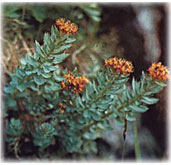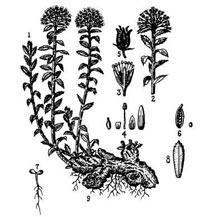
Rhiodola Rosea (Golden Root, Roseroot, Aaron's Rod) is a plant in the Crassulaceae family that grows in cold regions of the world. These include much of the Arctic, the mountains of Central Asia, the Rocky Mountains, and mountainous parts of Europe, such as the Alps, Pyrenees, Carpathian Mountains, Scandinavia, Iceland, Great Britain and Ireland. The perennial plant grows in areas up to 2280 meters elevation. Several shoots grow from the same thick root. Shoots reaches 5 to 35 cm in height. Rhodiola rosea is dioecious – having separate female and male plants. Rhodiola rosea may be effective for improving mood and alleviating depression. Pilot studies on human subjects showed that it improves physical and mental performance, and may reduce fatigue.
Rhodiola rosea's effects are potentially mediated by changes in serotonin and dopamine levels due to monoamine oxidase inhibition and its influence on opioid peptides such as beta-endorphins,] although these specific neurochemical mechanisms have not been clearly documented with scientific studies.
Rhodiola is included among a class of plant derivatives called adaptogens which differ from chemical stimulants, such as nicotine, and do not have the same physiological effects.
In Russia and Scandinavia, Rhodiola rosea has been used for centuries to cope with the cold Siberian climate and stressful life.[citation needed] Such effects were provided with evidence in laboratory models of stress using the nematode C. elegans, and in rats in which Rhodiola effectively prevented stress-induced changes in appetite, physical activity, weight gain and the estrus cycle.
Rhodiola Rosea has been used in traditional Chinese medicine, where it is called hóng jǐ.
 The dried rhizomes contained essential oil with the main chemical classes: monoterpene hydrocarbons, monoterpene alcohols and straight chain aliphatic alcohols were the most abundant volatiles detected in the essential oil, and a total of 86 compounds were identified (Rohloff, 2002). Geraniol was identified as the most important rose-like odor compound besides geranyl formate, geranyl acetate, benzyl alcohol and phenylethyl alcohol. Its oxygenated metabolite Rosiridol is an aglycon of Rosiridin (Kurkin et al., 1985a; Kurkin and Zapesochnaya, 1986b) - one of the most active constituents of Rhodiola in bioassay guided fractionation of Rhodiolathe extract (van Diermen, 2009). Rosiridin was found to inhibit monoamine oxidases A and B in vitro implying its potential beneficial effect in depression and senile dementia (van Diermen, 2009). More than 50 polar compounds were isolated from the water alcoholic extracts, they are: monoterpene alcohols and their glycosides, cyanogenic glycosides, phenylethanoids and phenylpropanoids, flavonoids, aryl glycosides, proanthocyanidins and other gallic acid derivatives. (Zapeschnaya, and Kurkin, 1983, 1983; Kurkin et al., 1985a; Kurkin, and Zapesochnaya, 1986a,b; Ganzera et al., 2001; Tolonen et al.,2003; Saratikov and Krasnov, 2004; Akgul et al., 2004; Ma et al.2006, Yousef et al., 2006, Ali et al.,2008; Avula et al., 2008).
The dried rhizomes contained essential oil with the main chemical classes: monoterpene hydrocarbons, monoterpene alcohols and straight chain aliphatic alcohols were the most abundant volatiles detected in the essential oil, and a total of 86 compounds were identified (Rohloff, 2002). Geraniol was identified as the most important rose-like odor compound besides geranyl formate, geranyl acetate, benzyl alcohol and phenylethyl alcohol. Its oxygenated metabolite Rosiridol is an aglycon of Rosiridin (Kurkin et al., 1985a; Kurkin and Zapesochnaya, 1986b) - one of the most active constituents of Rhodiola in bioassay guided fractionation of Rhodiolathe extract (van Diermen, 2009). Rosiridin was found to inhibit monoamine oxidases A and B in vitro implying its potential beneficial effect in depression and senile dementia (van Diermen, 2009). More than 50 polar compounds were isolated from the water alcoholic extracts, they are: monoterpene alcohols and their glycosides, cyanogenic glycosides, phenylethanoids and phenylpropanoids, flavonoids, aryl glycosides, proanthocyanidins and other gallic acid derivatives. (Zapeschnaya, and Kurkin, 1983, 1983; Kurkin et al., 1985a; Kurkin, and Zapesochnaya, 1986a,b; Ganzera et al., 2001; Tolonen et al.,2003; Saratikov and Krasnov, 2004; Akgul et al., 2004; Ma et al.2006, Yousef et al., 2006, Ali et al.,2008; Avula et al., 2008).
Recipe for a decoction with Rhodiola:
one teaspoonful of dry, ground rhizomes pour liter of water, cook about 10 minutes, leave to strain under the covers for about half an hour. We drink 2 to 3 cups a day to taste by adding sugar or honey better.
The way to prepare yourself tincture (by Saratikowa):
50 grams of dry ground rhizomes pour half liter (500 g) 40% ethyl alcohol (vodka). The dish tightly and put in 10 to 15 days in a dark place, then strain. Take half an hour before eating after 20-25 drops in a little water twice daily for 10 to 20 days.


